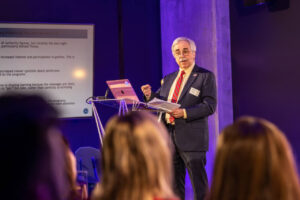
After 25 years teaching political science at the University of Mary Washington, Steve Farnsworth knows how to juggle emails and phone calls from reporters on deadline who want to tap into his mind. This spring semester – in the midst of a presidential race he’s been quoted as calling “unprecedented” – he added another layer, sharing his sought-after expertise on the other side of the globe.
In Poland on a prestigious Fulbright Award to teach a course called “U.S. Presidential Communication” at the University of Warsaw (UW), he worked both inside and outside the classroom to unravel misconceptions about politics in the United States. Now fresh off his third – and, as a “distinguished scholar” this time around, his most illustrious – Fulbright experience, he’ll share with UMW the knowledge and perspectives he gained overseas.
“It was a great opportunity to look at America’s place in the world through outsiders’ eyes,” he said of his stint in Warsaw and the time he spent on the course, a mix of the “Mass Media and Politics” and “American Presidency” classes he teaches at UMW. “I learned a lot about how America is viewed, and that will be really useful when it comes to teaching about the presidency and the media.”
To prepare, Farnsworth, who also directs UMW’s Center for Leadership and Media Studies, brushed up on Polish history and spent a year studying the language. He rented an apartment 30 minutes by tram from UW’s American Studies Center and went to work teaching – and lecturing – on U.S. presidential elections, political humor and the dynamic of disinformation.
“Stephen was open to providing lectures in many settings outside his host institution, all across Poland, even abroad [in Germany],” said Polish-U.S. Fulbright Commission Executive Director Justyna Janiszewska. “That encapsulates the Fulbright spirit of sharing one’s culture and expertise with diverse audiences.”
Previous work in the region had pulled him toward a Fulbright in Warsaw. A former journalist, Farnsworth had trained reporters in Eastern and Central Europe, contributing toward democratization efforts in the early 2000s. The experience led to his book The Global President, about how America’s commander in chief is perceived by people around the world.
And Poland was ready for his expertise. Farnsworth discovered a prevailing curiosity throughout the country about “what makes America tick,” from voting habits to NATO involvement. But it was his work in disinformation – his co-authored book Producing News in a Time of Disinformation was published last year – that was in highest demand, including as the topic of a Fulbright Poland keynote address he was tapped to deliver.

But his most recent Fulbright assignment wasn’t all work, said Farnsworth, who dined on Polish soups and perogies, explored cities like Lublin to the south and Gdańsk on the Baltic coast, and visited museums that tell the story of Poland’s difficult and sometimes tragic past. He was constantly surprised, he said, by the resiliency – even today – of the people of Poland, which shares a southeastern border with war-torn Ukraine and rushed to aid refugees fleeing the latest Russian invasion.
“It’s an amazing story of generosity and sacrifice of everyday Polish people, who have given their guest rooms and garages to refugees as the region has dealt with the biggest disruption in Europe since the end of World War II,” said Farnsworth, who has also held Fulbrights in Kuala Lumpur and Montreal.
All the while, he continued his daily array of media interviews with U.S. reporters covering everything from regional congressional races to the state of the presidency, despite a six-hour time difference. It’s important work, Farnsworth said, that fosters our understanding of one another – just like his Fulbright in Poland.
“A lot of non-Americans think about the U.S. as much more of a president-centric country than we really are. The reality is that when it comes to executing policy, presidents face a lot of obstacles. I think that’s an important understanding for people outside the U.S. to have,” he said. “And it’s important for Americans to understand that this misconception exists internationally.”
Hear Farnsworth discuss how political humor has become an increasingly important part of U.S. political communication, particularly regarding presidents and presidential elections during the first episode of the ninth year of Mary Talks.


